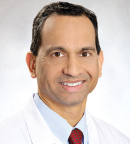
Ravindra Uppaluri, MD, PhD
Discussant of the abstract, Ravindra Uppaluri, MD, PhD, Chief of the Division of Otolaryngology in the Department of Surgery at the Brigham and Women’s Hospital and Director of Head and Neck Surgical Oncology at the Dana-Farber Cancer Institute, said this research underscores the complex biology of programmed cell death ligand 1 (PD-L1) and PD-L2 that has come to light in recent years.
“We heard about amplification, but we also know from many studies that oncogene-driven mechanisms are relevant for PD-L1 expression,” said Dr. Uppaluri. “In addition, recent work has shown there are posttranscriptional mechanisms that affect expression.”
Much Still to Learn
According to Dr. Uppaluri, researchers are also still learning about the functional roles of PD-L1, as new studies have shown PD-L1 expression is required on host cells but not necessarily on tumor cells for PD-L1 blockade to be effective.
“It’s interesting that two patients with amplification who did respond to treatment did not express PD-L1, despite the amplification,” said Dr. Uppaluri, who noted expression of tumor-infiltrating lymphocytes in these patients was 10% to 60% on average. “Amplification of PD-L1, PD-L2, and JAK2 genes may contribute to biomarker stratification, but it needs to be assessed as part of a global biomarker, including tumor-infiltrating lymphocytes and tumor mutational burden.” ■
DISCLOSURE: Dr. Uppaluri has consulted for and received research funding from Merck.

